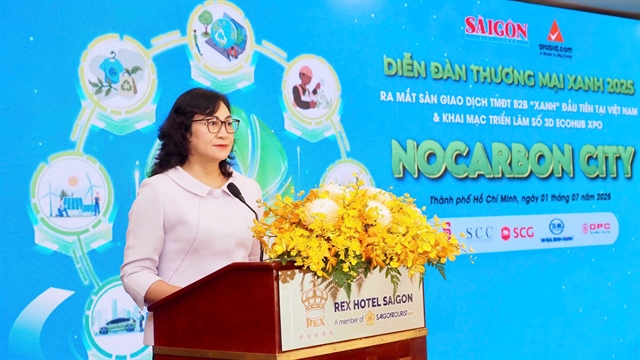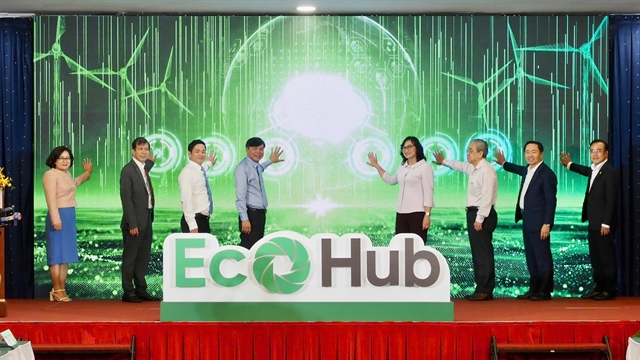As the world moves rapidly toward sustainable development, green transition and circular economy are no longer optional but imperative for Vietnamese businesses wishing to deeply integrate and secure a foothold in international markets, especially demanding ones, speakers told the 2025 Green Trade Forum in HCM City on July 1.

HCM CITY — As the world moves rapidly toward sustainable development, green transition and circular economy are no longer optional but imperative for Vietnamese businesses wishing to deeply integrate and secure a foothold in international markets, especially demanding ones, speakers told the 2025 Green Trade Forum in HCM City on July 1.
Speaking at the forum organised by Sài Gòn Giải Phóng (Liberated Sài Gòn) newspaper, the city People’s Committee and Arobid Technology JSC, Associate Professor Dr. Nguyễn Hồng Quân, director of the Institute for Circular Economy Development at the Vietnam National University – HCM City, said the shift towards a green, circular and low-carbon economy is irreversible.
Vietnamese businesses must adapt quickly to the “green barriers” imposed by international markets to strengthen their competitiveness through green production and the adoption of CSR, ESG and Net Zero practices, he said.
“Green transformation should not remain a slogan. It must be translated into concrete actions and solutions.”
He also highlighted the challenges, especially the lack of clear ESG regulations in the country.
According to a survey of listed companies, 73 per cent cited this as a key obstacle to ESG implementation.
Quân said Việt Nam is preparing to launch a pilot mechanism for the circular economy, a vital step toward addressing institutional and policy challenges related to capital, land, technology, and human resources.
Nicolas Lockhart, an expert at the World Trade Institute, said transparency is the top requirement for exporting to the EU, a global leader in green transition.
Exporters must disclose environmental and social impacts across the entire product lifecycle and comply with regulations such as deforestation-free sourcing and sustainable packaging.
He urged Vietnamese enterprises to develop clear compliance road maps, prepare full ESG reports and disclose accurate information since the EU employs rigorous assessment tools.
First green B2B platform launched

In response to the growing need for green transformation in trade, Việt Nam’s first B2B e-commerce platform dedicated to the green business community, EcoHub, was launched at the forum.
Nguyễn Khắc Văn, deputy editor-in-chief of Sài Gòn Giải Phóng newspaper, said EcoHub is the result of nearly two decades of the newspaper’s effort to build a green trade ecosystem.
More than a marketplace, it is a tool for businesses to disclose emissions data, increase production transparency and demonstrate social and environmental responsibility from the outset, he said.
Jointly developed with Arobid Technology JSC, the platform is designed to help businesses, especially SMEs, overcome the barriers of green transition like emissions measurement, transparent data disclosure, access to sustainable technology partners, and market entry into demanding regions such as the EU, US and Japan.
The platform is structured around seven key sectors, energy, transportation, finance, consumer goods, materials, services, and digital technology, creating an open, comprehensive green trade ecosystem, he added.
Deputy Minister of Industry and Trade Phan Thị Thắng praised the launch of EcoHub, calling it a vital foundation for businesses to green their supply chains and boost connectivity in global markets.
“This will provide the business community with a competitive edge when participating in global supply chains oriented towards low-carbon emissions and green growth."
She also outlined key policy directions to support the green transition.
She stressed the need to continue improving the legal framework, enhancing inter-agency coordination, and developing favourable policies to promote green and sustainable trade.
She called for the accelerated adoption of digital technologies like artificial intelligence and the Internet of Things in production to optimise operations, reduce emissions, and effectively utilise clean energy sources.
Specific support programmes should be implemented to help SMEs participate in green B2B platforms through digital skills training, integration of ESG management tools, and green traceability systems, she said.
She proposed to enhance supply chain linkages by encouraging leading enterprises to guide and support smaller suppliers within their ecosystems to pursue green transformation.
She stressed the need to foster a culture of green consumption to drive market demand and incentivise businesses to reform their production processes in a more sustainable and transparent way.
Also launched at the forum was EcoHub XPO, a 3D digital exhibition themed “NoCarbon City”, a fully digitalised model of a carbon-neutral city using 3D and virtual reality technologies to simulate green production processes, electric vehicles, low-carbon materials, and solar power systems.
According to the organisers, EcoHub XPO represents a new vision for HCM City—modern and technologically advanced, but rooted in sustainable development and social responsibility.
This aligns with Việt Nam’s national strategy for green growth and digital transformation in the coming decades, they added. — VNS





